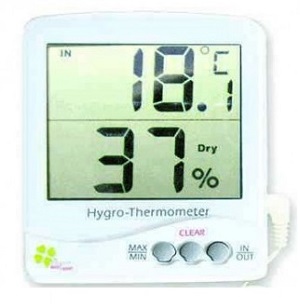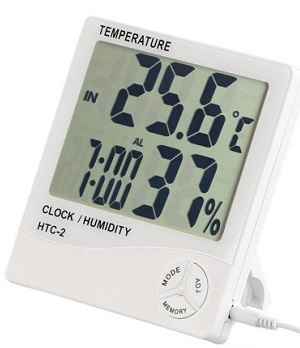The temperature of our skin is between 30 à 35 [°C]
(86 to 95 °F) depending on the season. It is natural for us to find it pleasant
to be in an ambient temperature which is reasonably lower than this skin
temperature.
But:
- If the air is too dry our perspiration evaporates very easily, and our skin can become too dry. While this situation exists in the Sahara desert, it can also be the case for winter sports. In fact, with the air being cold, our body heat is easily evacuated by convection and radiation, and our “sweat” production will be minimal. Our skin can therefore lack humidity (cracking or chapping).
- If the air is too humid our sweat evaporates with difficulty, and having damp or sweaty skin is not very pleasant. The hotter the air, the more sweat the body has to produce to evacuate its heat. However if the air is humid, it is difficult for this sweat to be evacuated, and we will rapidly be “drenched”.
We can therefore summarise the 4 main situations:
- The temperature is slightly chilly and humidity is reasonable:
To limit our heat losses we are able to insulate ourselves by wearing certain garments. Light healthy and invisible perspiration will adjust the evacuation of energy. It is a perfectly tolerable normal situation.

- The temperature is a bit chilly and humidity very low (dry air):
Heat is evacuated very easily (cold air), and our body produces very little perspiration. This evaporates very quickly (dry air), and our skin risks becoming too dry.
In addition this situation increases the phenomenon of static electricity inside the buildings. In the winter we can experience small unpleasant “shocks” in the corridors of hotels or offices, when the air is too dry.
- The temperature is warm and humidity reasonable:
We wear the minimum amount of clothing that is morally acceptable, and a little more evaporating perspiration adjusts the energy evacuation. It is a very tolerable and normal situation.

- Temperature is warm and humidity high:
Heat is difficult to evacuate (hot air), our body
produces sweat. This is not easily evaporated (humid air), and we risk becoming
soaked. If we can’t lower the temperature or remove clothing, air movement has
to be increased to help our sweat evaporate by installing a fan in our office.
In addition this situation is not good for conserving papers or pictures and
will cause problems in photocopying rooms or museums.
We should nevertheless put the problem into perspective. Simple temperature control will in most cases be sufficient. In our french temperate climate without any humidity control, the majority of buildings offer acceptable comfort conditions both in winter and in summer.
For certain specific premises, such as museums,
laboratories, swimming pools, controlling humidity will obviously be essential.
Question
Provide a detailed and complete list of all the advice we could give to an elderly or other vulnerable person during a heat wave period, other of course, than that of installing an air conditioner…
Reduce to the maximum, sources of heat input to the building
– Close the windows, curtains, blinds and shutters during the day, particularly on the side exposed to the sun.
– Open the windows and shutters at night.
– Limit the use of electrical equipment such as lighting, electric hot-plates, ovens, televisions, computers, etc.
– Install low energy consumption light bulbs.
Reduce the quantity of heat to be evacuated by the organism
– Limit physical activity, rest up
– Avoid food which is too rich
Help the organism evacuate its heat
– Live in the room which is the least exposed to sunlight, close the communicating doors to exposed rooms
– Dress in light clothes
– Drink a lot (liquid evaporation helps to evacuate heat)
– Air the room or use a fan (even if the room temperature is higher than skin temperature, fans help to evacuate sweat and therefore produce a cooling effect)
– Use a water spray to dampen the skin, or other means; a shower, etc.
– If the type of flooring is appropriate, and slipping can be avoided, dampen the floor and the curtains, the wall coverings, etc.
– Only go out in the evenings, or stay in air conditioned rooms; avoid crowded non air conditioned places.
